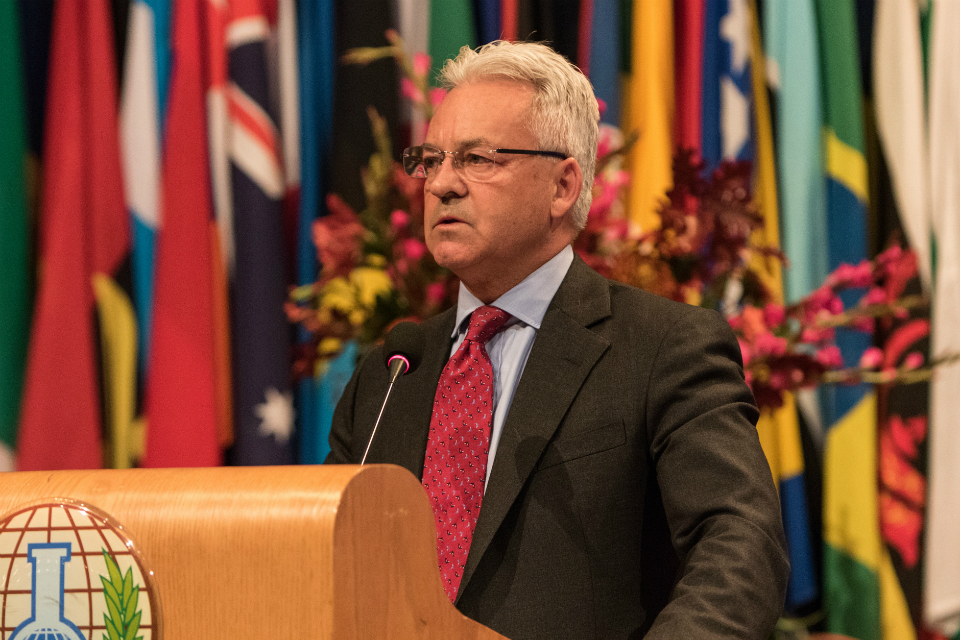Review of chemical weapons: UK statement to Organisation for the Prohibition of Chemical Weapons conference
At the Fourth special session of the Conference of the States Parties, Sir Alan Duncan gave a statement about how the Chemical Weapons Convention operates.

I congratulate you, Mr. Chairman, on your election, and also offer the United Kingdom’s warm appreciation for all that Ambassador Puja has done to prepare for this Conference.
also congratulate Director General Arias on his appointment and can assure him of the UK’s support. Mr. Chairman, the United Kingdom fully supports the statement made by the European Union, and I’ll tell you why.
Historical use of chemical weapons
This month I joined millions around the globe in commemorating the centenary of the end of the First World War. It was humanity’s collective revulsion at the use of chemical weapons in that war that eventually led to the creation of the Chemical Weapons Convention.
Three years ago, 100 years after the first significant chemical weapons attack in Ypres, all of the countries represented here today met at the scene of that battle and made a declaration. We all declared that any use of chemical weapons was not only immoral but illegal. Likewise, we all expressed our strong conviction that anyone found to have used such weapons should be held to account.
Recent use of chemical weapons
The United Kingdom’s conviction on this remains absolute. Unfortunately, the same cannot be said of all those who were present 3 years ago.
The tragic reality is that chemical weapons have been used repeatedly in the 5 years since the last Conference. Hundreds have been killed in chemical attacks in Syria and Iraq. One person was killed in Malaysia last year; and this year a Novichok nerve agent was used to deadly effect in my own country, the United Kingdom.
This Conference must acknowledge the facts of those attacks, and the OPCW’s excellent work in investigating the hundreds of reports of chemical weapons use in Syria. Because not doing so risks undermining the central purpose of the Convention, and would betray the efforts of our predecessors, who tried so hard to ensure that no-one else would suffer the horrific effects of chemical weapons.
Priorities for the Organisation for the Prohibition of Chemical Weapons
So, the priority for the OPCW must be to prevent any further use. This means that we have to ensure that States stick to the rules. We must also make clear to the potential users of chemical weapons – whether they be states or terrorist groups – that they will not get away with it: the OPCW can and will respond.
In order to do so, it is essential that the OPCW can always call on the most talented people and the best laboratories to track down violators. It also means we should update the Convention to add Novichoks to the schedules. And it means that the Organisation needs to keep up with the astonishing advances we see in science and technology so as to prevent their misuse, that means that we need to promote responsible research.
We were proud to join our fellow States Parties who voted overwhelmingly on Tuesday for a new OPCW budget, which included funding to identify the perpetrators of chemical weapons attacks in Syria. We welcome funding to improve the Organisation’s cyber security so as to protect the information it holds from the range of threats it faces, which we saw just last month. And so we, the United Kingdom, are glad to pledge one million pounds to help the OPCW attribute responsibility for chemical attacks, modernise its laboratory, and assist states in implementing the Convention.
As we have shown by our own actions, the UK will not turn a blind eye to chemical weapons attacks, whether in Syria or in the UK. We look forward to the conclusions of the Fact-Finding Mission after its extensive investigation into the horrific attack in Douma. And the OPCW must promptly begin its own attribution work, as agreed. As so many countries have shown this week, supporting OPCW attribution is not about choosing sides in big power politics, it is about restoring the global taboo against chemical weapons.
The UK is playing an active part in discussions at this Conference and in work to strengthen the implementation of the Convention in the years ahead. In the face of today’s threats, we must all reaffirm our shared commitment to work together to achieve the core objective of the Convention – we must prevent the use of weapons that were already deemed abhorrent 100 years ago. Such weapons have no place in the 21st century. If we all work together, we can ensure that they are never used again.